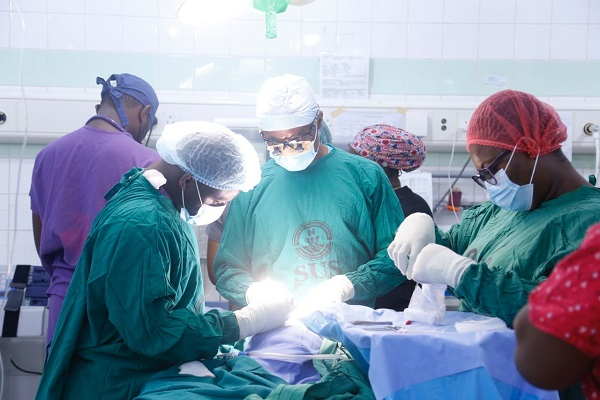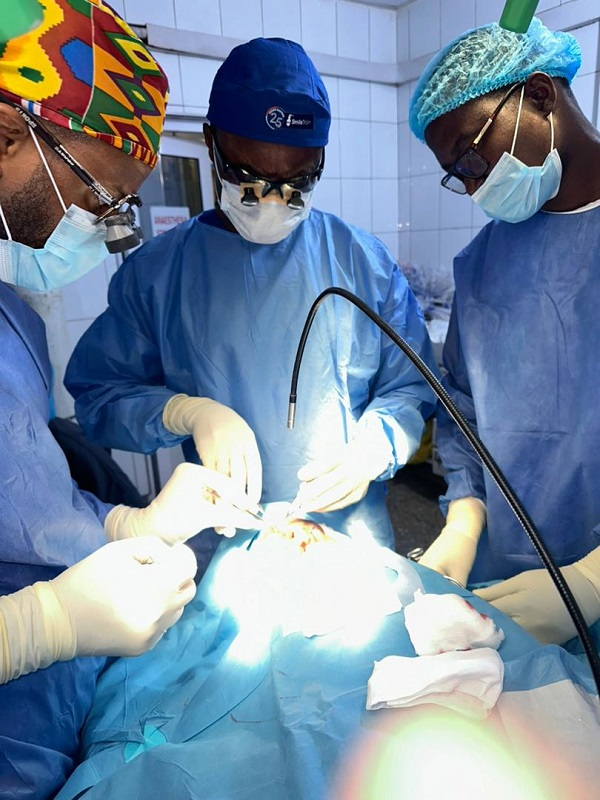“When life gives you lemons, make lemonade out of it.” This iconic phrase perfectly encapsulates the remarkable professional journey of Dr. Solomon Obiri-Yeboah, a renowned Craniofacial Surgeon in Ghana and West Africa.
Despite facing overwhelming challenges, including the loss of his mother during a critical period of his education, Dr. Obiri-Yeboah’s unwavering perseverance, determination, passion, and faith in God propelled him to defy all odds and achieve exceptional medical excellence.
Only a few people can go through what Dr Obiri-Yeboah went through without contemplating dropping out of school due to lack of financial support. The surgeon eventually turned his struggles into opportunities.
Narrating his experiences to me on Wednesday (October 1, 2024), the renowned Craniofacial surgeon, said “My mother died along the line. Life became very terrible. Very uncomfortable. Very difficult. And I had to repeat my class twice in MB2 and MB3. Life became difficult in terms of what to eat, finances, fees, and everything. My mother was my backbone but dropping out of school never came to my mind because of the God factor.”
The Surgeon explained that along the line, a lecturer at the medical school, Dr. Asante Poku, noticed the difficulties he was going through and introduced him to the then-school accountant, Mr. Tweneboah Kodua, who also introduced him to Mr. Fred Asare, the Director of Village of Hope Orphanage Home.
Initially, they said he(Dr Obiri-Yeboah) was above the age limit of the Home but took his little sister instead, which was a big relief, but later, the Home took over his school fees and also supported him with a monthly stipend. This gave him great relief and was able to go through 2001 to 2004 while studying Dentistry at the University of Ghana Dental School in Accra without even a referral.
He said there were times that school life became tough for him to the extent that he sometimes had to go to bed without eating the whole day adding that at times he could only eat once a day while going for about 10 lectures in a day.
Dr. Obiri-Yeboah expressed gratitude to God for intervening through some of the members of the Church of Pentecost at Atomic and Legon in Accra who supported him during his difficult moments.
“I used to go for Bible studies and lead their Bible studies. So, the members knew me. And sometimes the church organised and visited me.
They used to bring me gari, provisions, and other items which actually kept me going. Along the line, some of my friends who noticed my difficulties also started supporting me. I need to mention Ashinyo Anthony and then Dr. Nana Hagan as some of the notable people who came to my aid,” Dr. Obiri-Yeboah recalled.
Surgical operations
As a Craniofacial Surgeon, Dr Obiri-Yeboah specialises in surgical procedures to correct congenital or acquired deformities of the skull, face, and jaw. His work encompasses among others surgical operations to correct skull and facial malformation, jaw tumours and trauma among others.
The renowned surgeon is currently the Head of the Departments of Oral, Maxillofacial Surgery and Community Dentistry at the School of Dentistry at the Kwame Nkrumah University of Science and Technology (KNUST) in Kumasi in the Ashanti Region.
Explaining further his work, Dr Obiri-Yeboah said Craniofacial surgery is a surgical subspecialty of Maxillofacial surgery that deals with congenital and acquired deformities of the skull, face, and jaw bones, skin, muscle and teeth, etc.
“Maxillofacial surgery has to do with the bony tissues on the face, mandible, maxilla, and then the soft tissues surrounding it,” he added.
“I operate on swellings or tumours of the jaws. And then trauma, when somebody is involved in an accident or falls from a height, breaks the jaw or any bone of the face, the Maxillofacial surgeon is responsible for taking care of such patients.
People who are involved in accidents, those who get their faces damaged, have broken jaws, broken teeth, or when everything is scattered, we can put them together to look original as before. We can bring you to near normal or near how God created you,” Dr Obiri-Yeboah stated.
He added that the Craniofacial aspect of the job has to do with reconstruction of the cranium, the skull, and re-arrangement of the face stressing that you may not need to have an accident before going through that surgery.
However, in some cases he said, some patients have certain diseases and syndromes that cause their faces to become twisted.
The Craniofacial Surgeon he noted, therefore, “re-arranges the bones to make a patient’s face look more symmetrical.”
Dr. Obiri-Yeboah said the skull is normally composed of bones which were separated by sutures—- an immovable junction between two bones, such as those of the skull that allow for expansion of the skull as the brain grows.
He explained that when babies are born, the brain grows, but in some children, because of certain problems, these sutures fuse at the wrong time thus putting pressure on the growing brain.
“But there’s no room for the brain to grow. So, we go and then open up the skull and expand it so that the brain gets room to grow as well as putting the head into the right acceptable shape,” the Surgeon pointed out.
Surgical treatment of what Dr. Obiri-Yeboah described as the midface deformity required numerous cuts of the facial bones and advancing the midface region to a predetermined level.
The highly skilled surgeon said he works mostly with Neurosurgeon Dr Frank Nketia Boakye to transform lives by restoring form and function to individuals with complex Craniofacial conditions.
Difficult surgery
Asked what was his most difficult Craniofacial Surgery, Dr Obiri-Yeboah mentioned syndromic cases where he needed to reshape the forehead and then also bring the face forward.
The renowned surgeon said in some of the cases you can spend about 10 hours doing the surgery because of the brain tissues adding that the Neurosurgeon alone can spend at least six hours working on the brain to make sure that there is no bleeding.
“After we take the bones out of the skull, the neurosurgeon will be working on the brain, making sure there is no bleeding, or that everything is okay whilst I take the skull to a different table and work on it, re-arrange it, and bring it back to the patient,” he intimated.
He said for instance that some children were born with rare diseases like Crouzon syndrome and Pfeiffer syndrome. Dr. Obiri-Yeboah stated that Crouzon syndrome is a genetic condition in which the seams of the skull fuse in abnormal ways and affect the shape of the head and face.
Pfeiffer syndrome on the other hand, he stated is a complex genetic disorder in which certain bones in the skull join together early in their development.
“The difficulty lies in how we do the cutting. You need to be very careful that you don’t even go into the brain and damage tissues in the brain. And for some of the cuts you are not seeing with your eyes. You have to know where to pass and where to hit. So you take your instruments to a blind spot. You are not seeing, but you believe that’s where you are going. And then you hit it, you break it, and then now you can move it,” Dr. Obiri-Yeboah revealed.
Virtual operation
He further recalled that in one particular difficult surgery he performed on a patient about a year ago, where he needed to split some bones by trying to break the maxilla from where it fits, from the base of the skull, he had to seek the help of a more experienced specialist in the United States of America to guide him virtually to perform the surgery.
Dr. Obiri-Yeboah said he used the Ohana eyeglasses to facilitate communication between him and the experienced specialist in the US who also used his laptop or computer to see exactly how the operation was being carried out here in Ghana.
He said during the surgery whatever he was doing at the theatre reflected on the screens of the US doctor’s computer via the Ohana eyeglasses.
The US specialist whom he described as his boss then navigated him through the surgical processes until it was finally done.
“On a virtual programme I called through the Ohana, I wore eyeglasses to perform the difficult surgical case. The US specialist directed me through his laptop or computer as he saw whatever I was seeing in the eyeglasses directly including the patient. He then led me through the processes and directed me until the completion of the surgery,” Dr. Obiri-Yeboah added.
He said after completing that difficult surgery, the second one he performed on another patient was a bit easier.
God Factor
Dr. Obiri-Yeboah who is currently the Finance Committee Chairman of the Bompata Pentecost International Worship Centre (PIWC), Kumasi, and was the Presiding Elder at the Church of Pentecost at Kwadaso English Assembly in the Ashanti Region for seven years stated that “I don’t do anything outside Jesus Christ. So, the Holy Spirit has always been guiding me even in surgery.”
“You are dreaming about how you are going to do your cuts, how you will go about it. Most of the time we plan our surgeries, dream about it think through it all night and on the way to the operation theatre. But sometimes you get there and all your plans just change… And there are times when I am stuck, I begin speaking and praying in tongues then ideas come. So, God has guided me in so many ways,” he stated.
“The path I have taken has been directed by God. And I don’t like blowing my horns, but God Himself takes me step by step to wherever I am going. One of my foundations, or let me say the pillar verse that I always use or say is Acts 17:28,” the renowned surgeon revealed.
He said he had a solid foundation in Christ at the Living Faith Christian Ministry, Koforidua but he was baptised at the Apostolic Church – Ghana.
Qualifications, career
Dr. Obiri-Yeboah was born in Koforidua in the Eastern Region on December 26, 1973. He began his career as a Dental Surgeon (BDS) and progressed to become an Oral and Maxillofacial Surgeon.
He developed an interest in facial clefts and craniofacial surgery during his residency training in Oral and Maxillofacial Surgery at the Ghana College of Physicians and Surgeons between 2007 and 2015.
He also had the opportunity to complete a one-year international fellowship in Cleft and Craniofacial Surgery at the University of Alabama Children’s Hospital in Birmingham, USA.
As a senior lecturer at the KNUST School of Medicine and Dentistry and Head of the Departments of Oral and Maxillofacial Surgery and Community Dentistry, he lectures on local anaesthesia in dentistry, oral radiology, oral and maxillofacial surgery, introduction to biostatistics, health systems, and preventive dentistry.
Dr. Obiri-Yeboah provides clinical services, and trains house officers and residents as a Senior Specialist Oral and Cranio-Maxillofacial Surgeon at the Komfo Anokye Teaching Hospital in Kumasi in the Ashanti Region.
He provides clinical care in cleft and craniofacial surgeries and basic oral health care.
Dr. Obiri-Yeboah is also involved in international collaborative programs that provide clinical care, training, and research in cleft palate and craniofacial surgery.
The renowned surgeon also provides community services in health education and promotion, supports orphanages, and volunteers in free cleft palate and craniofacial surgical outreaches.
He has presented many papers at local and international conferences, workshops, and symposiums. He has published 32 peer-reviewed journals.
Dr. Obiri-Yeboah won the visiting scholar and emerging leader awards of the American Cleft Palate and Craniofacial Association (ACPA) in 2017 and 2019, respectively. Currently, he is the Chairman of the ACPA’s Global Care SIG.
He is married to Patience Obiri-Yeboah, and the couple is blessed with three children—two girls and a boy.


